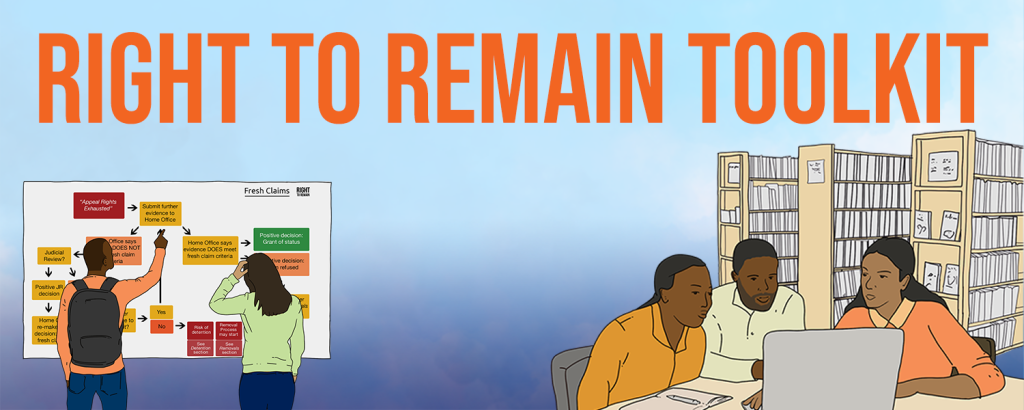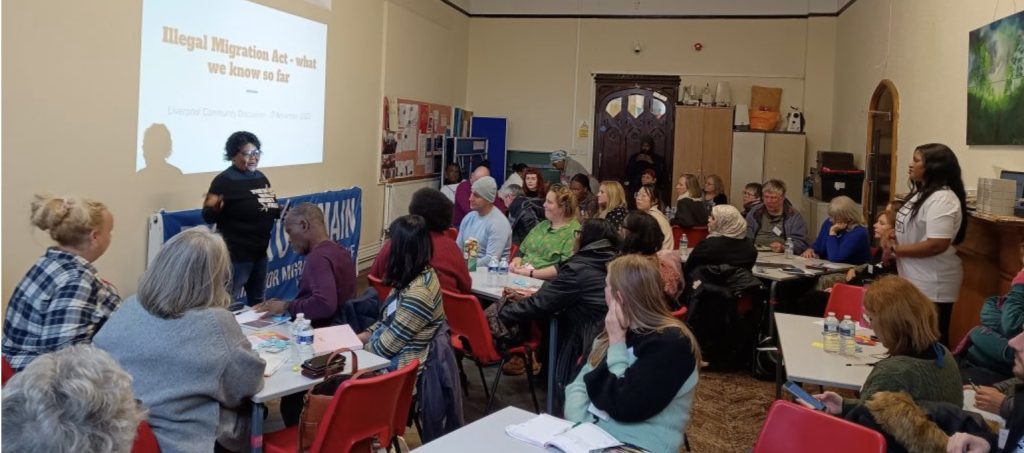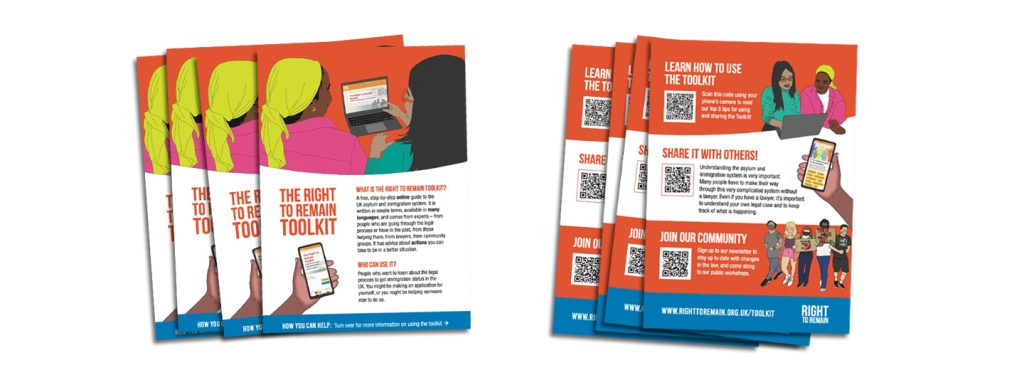Building Knowledge – Public legal education at Right to Remain
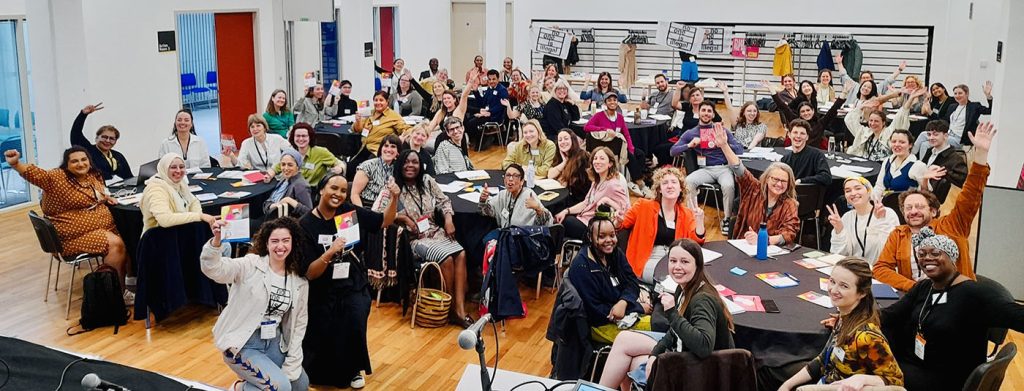
We work with communities, groups and organisations across the UK to provide information, resources, training and assistance to help people to establish their right to remain. Our focus is on boosting our community’s power to challenge injustice in the immigration and asylum system and create an alternative world.
Our public legal education work was born out of our community’s changing needs due to harsher asylum and migration law, policies and landscape. Our community said they must understand the asylum and immigration law and system better so that they can support each other to secure their immigration status proactively from the beginning of the process, in order to protect the community from the risks of the violence and trauma of detention and deportation. In this way, our resources educate but also are the source of a movement to fight the system.
Since then, the main resource of our public legal education work about the asylum and immigration system, our Right to Remain Toolkit, has become the critical infrastructure for the entire asylum and migration field. The Toolkit is a public, free, accessible lifeline for many who are stuck in a Kafkaesque system: in 2022/23, it was used by 321,997 people online.
Knowledge is power
We also demystify legal support, explaining clearly how allies and supporters who are not accredited to give asylum and immigration legal advice can still safely provide vital support in the community. Our work scales up the amount of legal support (as opposed to legal advice) available, alleviating the pressure faced by the struggling legal advice sector. It connects people in the system with their supporters, giving them knowledge and confidence to fight for the right to remain together and seek ways to survive the system within their local community. This knowledge of the system will remain central to our movement.
In fact, our legal education work goes beyond a simple gesture of information provision. Our work is relational. We carefully and consciously do this in a way that calls for solidarity to bring in more people and groups into the movement and focuses on building power in our community.
The Toolkit and our workshops act as a portal through which people can enter the shared struggle for migration justice and start taking collective action to change the system – because you need to understand the system to fight it, just as our community said when we developed the Toolkit over ten years ago. The Toolkit is therefore the basis of our strategic convening and campaigning, including our experience-led community organising work, These Walls Must Fall.
We are the only organisation that does what we do. Keep reading to learn more.
Our Legal Education team
We currently have two Legal Education Officers who maintain and update all of the resources mentioned on this page, provide guidance and support to and facilitate virtual and in-person workshops for our community. Our public legal education programme is overseen by Eiri Ohtani (Director). The Toolkit’s design, technical infrastructure and system was managed by our ex-staff member Michael Collins who also advises on its development.
Our Resources
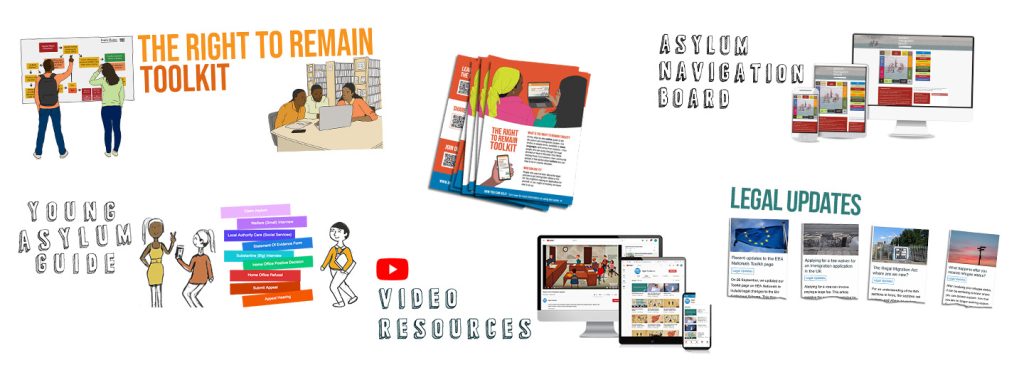
The Right to Remain Toolkit may be our key resource, but we have other information resources too. The Asylum Navigation Board is a “serious board game”, and is now online too. Our Young Asylum Guide is an interactive website to help young people to survive the asylum system. We have many informational, multilingual videos on our Youtube channel, a regular newsletter, and our Legal Updates blog and email list keep thousands of subscribers up to date with the latest developments. Find out more below…
The Right to Remain Toolkit
The Right to Remain Toolkit is a free, accessible, step-by-step guide to the UK asylum and immigration system. It is for people who want to learn more about the legal process, or a particular part of the legal process. You might be making an application or are thinking about it, or you might be helping someone else to do so.
Understanding the asylum and immigration system, and your own legal case, is very important. Many people have to make their way through this very complicated system without legal representation (without a lawyer). Even if you have a lawyer, it’s important to understand your own legal case – this is your case and your life and you need to keep track of what is happening and whether the lawyer is doing the things they should be.
The information in the Toolkit comes from experts – people who are going through the legal process or have in the past, from those helping them, from lawyers, from community groups. It covers different stages of the legal system and procedures, with detailed information on rights and options at each stage, and advice about actions you can take to be in a better situation, or to help someone else.
People use the Toolkit to practise for their asylum interviews, gather their own evidence, prepare for their own appeals when they cannot find a lawyer to represent them, and exercise agency by equipping themselves with the knowledge of what could happen to them and options they have. Many groups, large and small, use it for their staff and volunteer training and for their work at large. Lawyers and students use it as a reference point and other professionals such as youth workers, ESOL (English for Speakers of Other Languages) teachers, and doctors use it to support people going through the system.
This popularity is due to the fact our resources, workshops and outreach are accessible, practical and empowering. It is accessible because it is designed specifically for non-specialists and people going through the system, based on our community’s feedback collected over the years. It is practical and empowering because it includes information about specific steps people can take to improve their chance of securing their right to remain (based on the tips contributed by our community) and helps people to understand what might happen to them to help prepare for all scenarios (an example would be our ‘How to prepare in case you are detained’ Toolkit section) to take better control of their lives, with or without the help of legal advisors and solicitors.
In 2023, we completed a Toolkit reflection exercise with a small number of trusted colleagues and organisations whom we know are regular users of the Toolkit. We wanted to understand bot their habits and practise when using and sharing the Toolkit, and the positive impact that the Toolkit has had upon their work and/or community. Read the report here.
The reflection exercise taught us this: that the Toolkit and our workshops act as a portal through which people can enter the shared struggle for migration justice and start taking collective action to change the system – because you need to understand the system to fight it.
'Core' pages of the Toolkit (What is Asylum?, Asylum Screening Interview, Asylum Substantive Interview, Home Office Asylum Decisions, Evidence for asylum, immigration and human rights cases) have been officially translated into some or all of the key languages commonly spoken by people seeking asylum in the UK: Amharic, Arabic, Farsi, French, Oromo, Pashto, Sorani, Spanish, and Tigrinya.
We also rely on a Google Translate option to fill in the gaps for the rest of our pages and users who speak other languages (with over 120 language options available). To learn about our key tips for navigating and sharing the Toolkit, read our 5 Things to Know When Sharing the Toolkit blog here.
Asylum Navigation Board
The Right to Remain Asylum Navigation Board is a way to understand each step of the UK asylum system.
Participants can learn about what people going through the system and those supporting them can do to be in a better position.
As they navigate around the board, participants can pick up “Information Cards” which outline what that stage of the process is, and how it can be navigated.
Many problems can arise during the process of seeking asylum. For each stage on the board, participants can look at Problem cards for that stage of the process (colour coded to match the stage on the board). There are ideas for possible solutions to those problems on the reverse "Action" side of the card.
The navigation board, developed by Right to Remain, Dr Vicky Canning, and Calverts Cooperative, was originally a “serious board game” with a physical board. In response to the Covid-19 crisis, we have developed it as a free online resource.
Through the Board’s pages, you will be able to navigate through each stage of the process, read the information cards and then consider the problems that may be faced at each stage. We recommend you do this with at least one other friend or supporter.
When you read a "Problem" card, discuss the problem with your friend(s). What actions can you suggest that might help in the situation? Once you have finished discussing, you can click to read the suggested actions. Then, you can move on to the next stage of the process.
YouTube videos
Many of our resources are summarised in our videos. You can access our Video resources at the top of the Toolkit page, or by searching for ‘Right to Remain’ on YouTube.
Watching videos might be a good option for those of you using our resources with a group of people, or for people who prefer to learn by listening and watching instead of reading.
We have plenty of videos. Some are shorter, and summarise stages of the asylum process. Others are longer and go into more detail about the law or actions you can take at a certain stage of the process.
We also have videos on core topics (such as claiming asylum, the screening interview, the substantive interview, and what happens after a Home Office refusal) available in Amharic, Arabic, Farsi, French, Oromo, Pashto, Sorani, Spanish, Tigrinya, and Urdu.
Young Asylum Guide
The Young Asylum Guide is a visual guide through the stages of a young person’s asylum journey, which differs slightly from the journey of an adult.
It was developed by Croydon Council and Right to Remain. It is based on the Right to Remain Asylum Navigation board, first developed by Right to Remain, Dr Victoria Canning and Calverts Cooperative.
The guide explains the key stages of the UK asylum process that young people will go through. Use the guide as follows:
- Read the information about the stage of the asylum process.
- Look at the “Problem cards” underneath. Read the problem, then think about and discuss what you might be able to do in that situation.
- Flip over the problem card to read about possible actions to help.
- Use the "People who can help" option in the top right-hand corner to look through suggestions of different people who can support you through the system.
You can read more about the Young Asylum Guide and about its re-launch in 2023 here.
Legal Updates
Changes to UK immigration and asylum law and policy are frequent and complicated. Often, headlines and news pieces can be misleading or leave out important information about how changes will impact certain groups of people.
We write regular Legal Update blogs that summarise key points and simplify these changes for our community. You can access these updates on our website, or by subscribing to our Newsletter (and choosing to be notified of Legal Updates).
Our Legal Updates also cover changes that are new or still developing and so cannot yet go into the Toolkit.
Our workshops
Our workshops are one of the key ways in which we engage with our Toolkit community. Not only do we support organisations and groups with public legal education through these sessions, but they also allow us to improve our own understanding of what is happening on the ground and how we should be responding to the present difficulties that our communities are faced with.
Our workshops are led by our Legal Education Officers for support groups and people in the system, and their content can vary depending on need and demand. Generally, we include two staple elements within all sessions such as: stages of the asylum process, and the difference between giving legal advice (which only an accredited person can do) and legal support (which anyone can do with knowledge and confidence).
- How to effectively and confidently navigate the Toolkit
- The stages of the asylum process
- The difference between legal advice and legal support (including how to provide legal support in a safe manner)
- How to prepare for the impact of the Illegal Migration Act
In 2024, we will be expanding into delivering workshops about the immigration system more generally (as well as the asylum system).
You can read more about some of our recent workshops below:
Inside our workshop with the Scottish Refugee Council
Inside our Illegal Migration Act event in the North East
Inside our workshop with Napier Friends
The demand for our workshops remains very high: for example, in January 2024, we received requests for workshops from more than 20 groups - both large and small - across the UK, but have had to turn them down because of our capacity issue. If your organisation would like to request a workshop, please do so by filling in this form. We will endeavour to meet your request, but bear in mind we are a small team and so may not have the capacity.
If your organisation would like to request a Right to Remain staff member as a speaker or panellist for your event, please email esther@righttoremain.org.uk with as much information as possible.
Knowledge is Power
Knowledge is Power is Right to Remain’s flagship online workshop series, designed to assist an increasing number of people who are new to the asylum and immigration system and new to the Toolkit. It is a public, regular workshop, free for those in the system, or from an organisation with no funding, and £30 for each individual from a funded group.
At our Knowledge is Power workshops, we share important information about the asylum process and your rights. We will build our confidence in understanding the system, so that you can help yourself, or someone you are supporting, to be in a better position.
You can read about what happens at these workshops here.
Initiatives such as Knowledge is Power are so important, especially now that language such as ‘illegal’ migration has become commonplace.
At Right to Remain we believe that No One is Illegal. Read our Statement of Solidarity here.
Toolkit leaflets
Our Tookit leaflets are an excellent resource to share with your communities, as they link directly to the Toolkit via a QR code. We want to ensure people and groups working closely with or those who are going through the system themselves are aware of the Toolkit and can be supported, whether or not they have a lawyer. Our Toolkit belongs to our migrant and refugee community – so we want everyone in our community to have access to it!
Since we designed and printed out new leaflets in February 2023, we:
- Handed out over 15,000 Toolkit leaflets across the country.
- Have reached around 335 organisations and groups working closely with migrant communities.
- Have built new connections with organisations in areas we had no previous contact with.
Email esther@righttoremain.org.uk to request some leaflets for your organisation.
What people have said about our workshops…
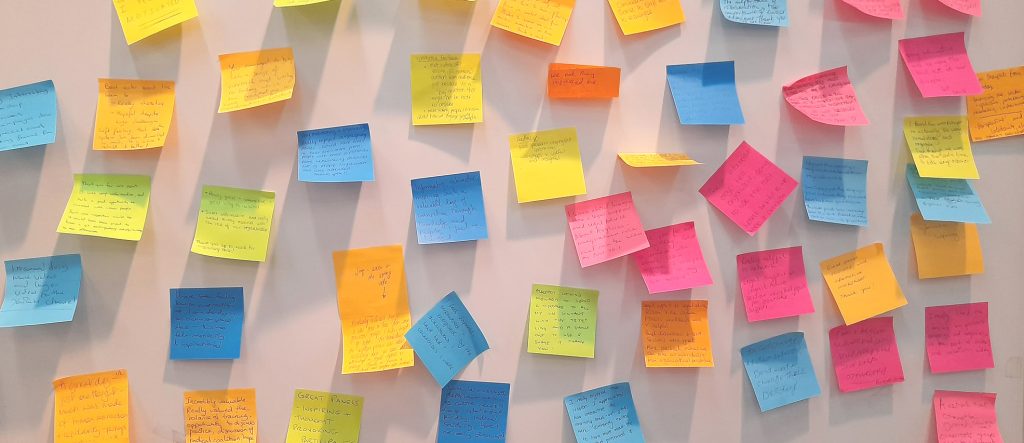
“Excellent day – very thorough, very informative, very practical and very constructive. Thanks!”
“FANTASTIC! I had used the Toolkit but only for myself – I will now use it more proactively with people seeking asylum.”
“Attending Right to Remain’s session was helpful to understand more about the asylum process and was an incredibly informative and empowering experience”
“So valuable, thank you so much. I’m really looking forward to exploring the Toolkit online as it looks like an incredible resource that I previously wasn’t aware of.”
“I feel inspired, empowered, and energised by the discussions I have had and connections I have made.”
“Informative, interactive, inspiring. Such a valuable day of connection through knowledge and purpose. I feel recharged.”

